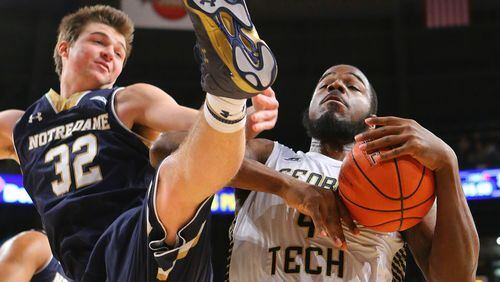Thoughts and observations from Georgia Tech's 62-59 loss to Notre Dame Wednesday night at McCamish Pavilion. AJC.com story here, myajc story here.
1. The things Tech did well – center Demarco Cox played probably his best game of the season and possibly his career. He scored 17 points on 10 shots, had seven rebounds and blocked three shots. It doesn't quite speak to the influence he had on the game. Particularly as the game progressed, Notre Dame collapsed on him every time he got the ball in the post, creating openings in the defense. His 17 points were a career high.
“Cox pounded on us,” Notre Dame coach Mike Brey said.
He was active on defense and effective even away from the post. Around the seven-minute mark in the second half, he somehow got isolated on Notre Dame guard Jerian Grant on the perimeter. Notre Dame spread the floor to let Grant attack Cox. Grant drove and Cox blocked his shot. On Notre Dame’s next possession, his help defense led to a steal by Marcus Georges-Hunt. On the possession after that, he helped again when Demetrius Jackson drove on Josh Heath, leading to a steal for Heath.
“I thought Demarco played an unbelievable game,” coach Brian Gregory said.
Guard Chris Bolden played his best game of the season, scoring 13 points on 5-for-6 shooting from the field and 3-for-3 from 3-point range. He also took turns with Corey Heyward in defending Grant, who scored 24 points in the first game against Tech and came into the game averaging 16.6 points per game, but was held to 12 points on 5-for-12 shooting.
Tech played about as well as it could in the first half, holding Notre Dame to 38.5 percent shooting (10-for-26), outrebounding the Irish 18-12, recording a 10-5 assist/turnover ratio and making 53.6 percent of its shots. While Notre Dame helped by playing a little out of sorts offensively, its shooting percentage was the third lowest in a half of the season.
The Jackets took a 12-point lead with 4:16 to play in the first half. An interesting fact: It was the largest lead anyone had taken on Notre Dame all season. Notre Dame’s previous largest deficit – 11 points, by Tech in the first game. Lead size counts for only so much, but figure this – Virginia, undefeated and No. 2 in the country, played Notre Dame at home this past Saturday, and the farthest it could get ahead of the Irish was 10 points.
2. What happened in the second half, and, really, from the end of the first half, did not register as a great surprise. After Tech took its 35-23 lead with 4:16 to play in the first half, the Jackets blew a defensive coverage and Steve Vasturia hit an open 3-pointer to cut the lead to nine.
On Tech’s next possession, guard Tadric Jackson, who entered the game having made five of 46 3-point tries, missed a 3-pointer, leading to a transition basket for Grant and chopping the lead to seven. On the Jackets’ final possession of the half, with the lead at eight, Bolden and Jackson misread each other on a pass on the perimeter, causing a turnover. What easily could have been a 12-point halftime lead was instead eight.
A rather similar thing happened in the first game in South Bend, Ind. Tech led by 11 early, but the lead was reduced to four by halftime, in no small part because the Jackets frittered away possessions and lost concentration defensively. It set the stage for Notre Dame's second-half comeback and ultimately its win in double overtime.
“Those plays cost you games,” Gregory said. “That’s where we’re at. We’re fighting for every single play.”
Wednesday, Tech opened the second half by giving up a 7-0 run. Notre Dame defended the post more aggressively and the Jackets didn’t handle it well. It was a little bit like a lot of games that the Jackets have played in their four-game losing streak and, more broadly, in the past couple seasons. Tech scored 35 points on its first 24 possessions and then 24 on its final 32 possessions.
“I feel like we came out a little flat starting the second half,” Bolden said. “I think we need to hold each other more accountable. It’s not on anybody else but the players.”
The Jackets made six baskets on 23 shots (26.1 percent), scoring 21 points, in the second half. To put Tech’s second-half offense into context:
Only three teams have had lower field-goal percentages for a half against Notre Dame this season – Binghamton (RPI: 340 as of Thursday morning, according to ESPN, 1-16), Navy (237, 6-10) and Coppin State (311, 0-15).
Only two teams have scored fewer than 21 points against the Irish in a half this season: Binghamton and Chicago State (330, 1-14).
And this after a half in which Tech shot 53.8 percent. Only three teams have exceeded that against Notre Dame this season: Providence (offensive efficiency rank, according to kenpom.com: 67), Michigan State (31) and Virginia (2). Tech's rank: 164.
Still, thanks to a string of stops, they had four possessions in the final 4:16 to take the lead. However, Cox, having a career game, didn’t take one shot. Tech went through two of the possessions without getting him a touch. (A lot of factors went into this, including Cox not getting great posts at various points, but overall Tech didn’t appear to play as though getting the ball to him was a high priority.)
And, as things would have it, Georges-Hunt didn’t score a single basket for the first time in his 79-game career, missing all six field-goal attempts while making six of seven free-throw tries.
“We’ve got some guys that are go-to guys, and it’s important that during those critical times, our go-to guys really respond,” Gregory said. “It’s not like they’re not trying. It’s not like they’re not competing. You can’t watch that game and then say that we didn’t compete at a high level. We’ve just got to finish some plays.”
Tech, the worst 3-point shooting team in the country, makes 50 percent of its 3-pointers (5-for-10). It turns the ball over nine times, its second-lowest total of the season. It holds Notre Dame, maybe the most efficient offensive team in the country, to an acceptable 1.1 points per possession and 43.5 percent shooting, which is 10 percentage points below the Irish’s average and the second-lowest rate of the season. And somehow loses.
“In each particular game, it’s maybe one different reason or another,” Gregory said. “That’s the challenge that you get to.”
3. Tech was in a bind before Wednesday and, obviously, the situation is worse now. Starting with the goal of making the postseason, the Jackets probably need to get to .500 in league play, 9-9, to have a realistic chance at the NIT. That means, of course, finishing 9-5. Of the remaining 14, there's not a lot of games that scream "easy win" for Tech, particularly given that it's 0-4. For starters, Tech will go to Pittsburgh and Virginia for its next two. Dropping to 0-6 is hardly out of the question.
After that, there’s road games at Miami, Duke and North Carolina and home games with N.C. State, Louisville and North Carolina. Plus two games with Clemson, a beatable team but one the Jackets have a 10-game losing streak against.
That’s a lot to ask.
But beyond that, Gregory a) has to find a way to keep his players keep digging and believing; b) has to figure out how to solve the offensive lulls that have plagued his team not just the past four games but, really, since the start of his tenure.
Asked what it would take the Jackets to get over the hump, Cox replied, "I would say a little bit more concentration on what we do and got to tighten up our offensive execution."
The season can yet turn around. It seems less and less likely, but the unexpected sometimes happens. But it’s going to require the Jackets to break out of patterns that seem fairly embedded.
“We can’t keep making the same mistakes,” Bolden said. “There’s different factors that go into our losses. Marcus gets in foul trouble the last two games the first half even though we’re up. That’s a blow. He comes back in the second half out of rhythm. We just keep moving on. It’s a long season. It’s not over right now.”
About the Author







